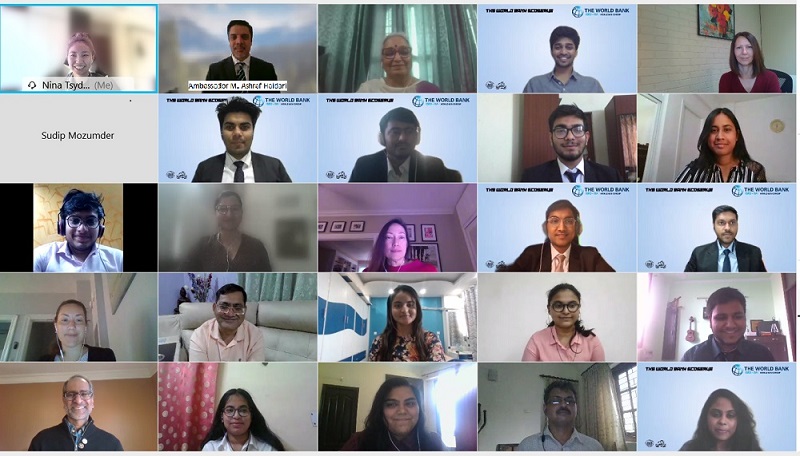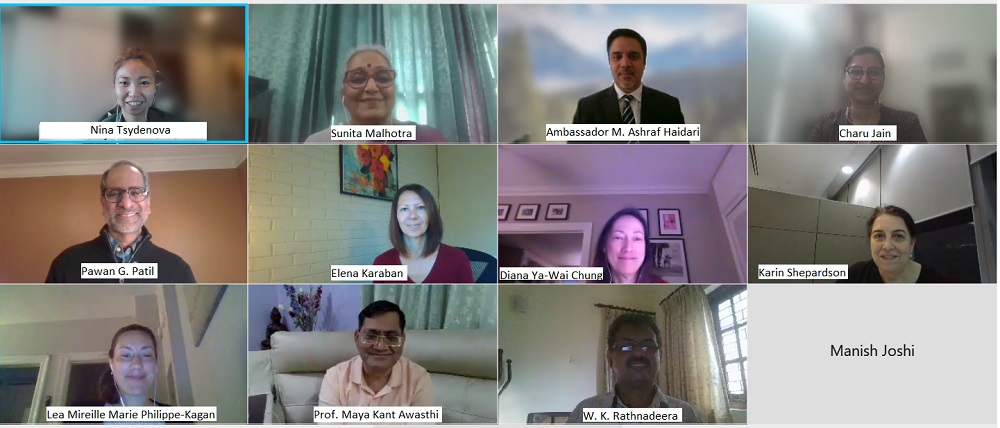April 03, 2021

Opening Remarks by SACEP Director-General Ambassador M. Ashraf Haidari at the India Student Entrepreneurship Competition on A.I.R. (Avoid, Intercept and Redesign) to Ensure “Plastic Free Rivers and Seas for South Asia” on April 02, 2021

Representatives from the World Bank,
Chairperson of the World Bank Group Youth2Youth,
Members of the Youth2Youth Global Youth Climate Network and Oceans Team,
Students and Faculty of Universities,
Ladies and Gentlemen,
I am Ambassador Ashraf Haidari from Afghanistan in Colombo, the newly appointed Director-General of the South Asia Cooperative Environment Program (SACEP). I assumed this position recently, following the departure of my predecessor and fellow Afghan. SACEP is a regional inter-governmental organization established in 1981 by our eight South Asian nations. Our headquarters is in Colombo, Sri Lanka.
It is with great pleasure that I open today’s Student Entrepreneurship Challenge. And I am pleased to congratulate all student teams and your inspired faculty mentors on the successful preparation of your project ideas. The entrepreneurship challenge calls on team-based social entrepreneurs from universities to generate creative solutions to tackling plastic marine pollution.
As you know all too well, plastic waste pollutes land, air, and flows into river systems and ultimately into the oceans. And this poses national, regional, and global threats to sustainable development with far-reaching economic, ecological, and public health consequences. We need only to look around to see that the problem of plastic pollution has become significantly worse during the COVID-19 pandemic.
The qualities that make plastic useful—including lightness, durability, strength, versatility, and low production costs—have shot up demand for its ever-growing use. But the mismanagement of plastic waste has created a mounting pollution crisis, which continues eroding ecological systems like rivers and oceans.
The global production of plastic is currently estimated to be around 300 million tons per year. And plastic pollution in the marine environment alone claims approximately 9.5 million tons, with 1.5 million tons ending up in the oceans annually. The South Asia region is the third largest contributor to plastic waste globally. And this is estimated to double by 2050, unless effective, tangible action is taken by all of us now and today.
Knowing the gravity of the plastic pollution threat to our environment, the United Nations Environment Assembly has adopted several resolutions on Marine Litter and Microplastics. The resolutions support the development of marine litter action plans, including an assessment of the effectiveness of or gaps in relevant international, regional, and sub-regional governance strategies and approaches to addressing the challenge of plastic pollution.
Through a first of its kind regional project, Plastic Free Rivers and Seas for South Asia, or PLEASE for short, SACEP looks forward to doing our part to discovering a long-term solution to the problem of plastic pollution in South Asia. We are grateful to the World Bank’s International Development Association and Parley for the Oceans for co-financing the US$50m regional project, which we believe will catalyze a regional transformation by supporting unique, but scalable eco-innovation solutions.
The project interventions will be implemented in all eight SACEP member-states. The project will introduce new and promising initiatives that promote reduction of plastic pollution. This is done by adopting circular approaches where regional cooperation and coordination could help better recognize, share, and replicate good-practice models to reduce the stock and flow of plastic waste.
One such approach is supporting the Competitive Block Grant Investments to reduce plastic waste with the objective of identifying, verifying, and investing in circular plastic economy solutions, while facilitating the exchange of knowledge, technology, and awareness of the proposed solutions.
In fact, this student entrepreneurship challenge and a similar ongoing challenge in Bangladesh are test cases to how a larger regional competition could take place – unlocking the creative power and talent of young people, whose ideas are likely the ones that will lead to the change we would like to see tomorrow, today.
The regional PLEASE project adopts the A.I.R. strategy, that was developed by Parley and launched at the United Nations some five years ago. It also serves as the basis for this competition.
Ladies and Gentlemen,
The involvement of the private sector is the key to successfully addressing the plastic pollution. Hence, the project will help facilitate the region’s transition toward a more circular economy, increasingly free from plastic pollution. This effort should improve regional and national strategies, policies, action plans, and standards based on better analytics and through public-private sector engagement, dialogue, and collaboration.
To this end, the PLEASE project will provide support to develop and improve national and regional plastic pollution mitigation strategies, policies, and industry standards. At the same time, it will provide technical and other necessary support to relevant institutions to identify, prioritize, collect, and analyze lifecycle data and identify data issues and gaps.
The PLEASE project has resulted from the hard teamwork of SACEP, the World Bank, and Parley for the Oceans, amid the global COVID-19 pandemic and the challenges it has posed. Despite this, however, I am pleased that with a collaborative and team-based spirit, much like that of the student entrepreneurship teams we have today, we have faced challenges head-on and identified solutions together.
Ladies and Gentlemen,
I wish to thank all the students here for representing their families, faculty, and universities in this challenge. It takes courage to put forward ideas, and clearly a lot of time, effort and energy has gone into your project ideas and preparation. We greatly appreciate your efforts to take on this challenge and look forward to supporting you and all young people across South Asia in not only addressing plastic pollution challenges but also all environmental threats to our South Asia region.
Finally, I wish to thank Dr. Pawan G. Patil, who I recently discovered is not only the World Bank’s Team Leader for the Plastic free Rivers and Seas for South Asia regional project, but also the co-founding Chairperson of World Bank Group Youth2Youth, with over 4,000 members, the World Bank Group’s largest voluntary service organization and running continuously for approximately 18 years, its longest serving community.
Dr. Patil, the floor is yours.
Thank you!